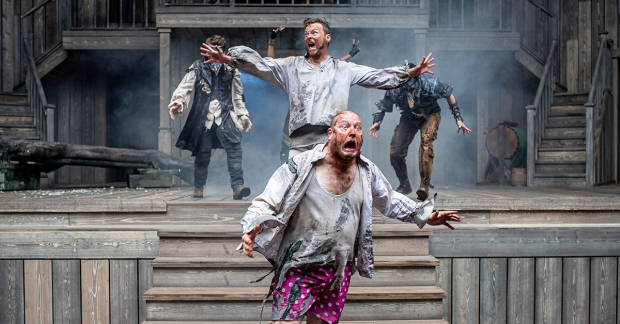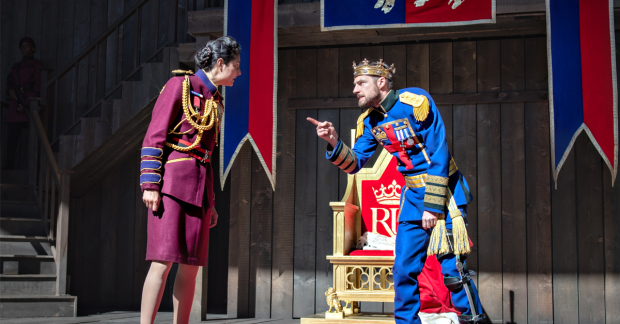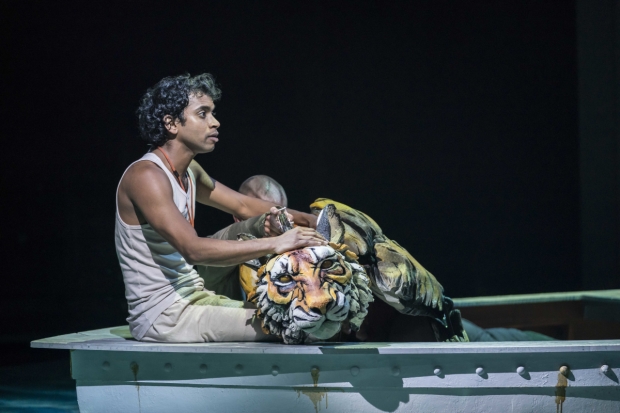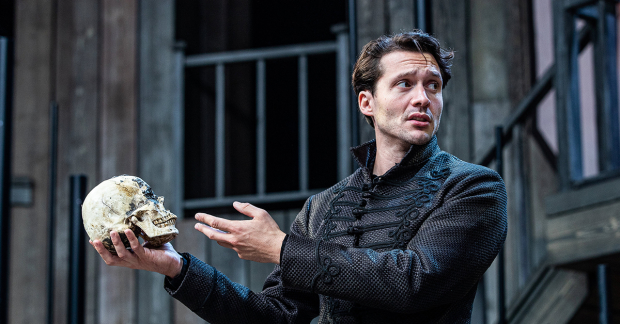Review: The Tempest (Shakespeare's Rose Theatre, York)

©2019 Charlotte Graham
There are many different ways to approach The Tempest, but Philip Franks' vibrant production, mischievous, magical and often very funny, feels just right for this theatre. As Franks points out, there is no chance of using technology to create magic in the open world of an Elizabethan-style playhouse, with performances either wholly or partly in daylight. However, if Franks doesn't have electronic wizardry at his disposal, he does have a huge space to romp in, all the yard area (the groundlings become adept at shifting at the last moment), and he has a large and talented company of actors.
Each of the two Shakespeare's Rose seasons (Blenheim Palace has been added this year) consists of two companies doing two plays each – and these companies are nearly 20-strong. With the relatively small named cast of The Tempest, Franks has the luxury of a dedicated troupe of six spirits (only one has to double as the seldom-seen Boatswain) – and the way he uses them is at the heart of an exhilarating production.
Alone on stage, Prospero contemplates his magic book as the audience enters, but the first action sees Ariel and his spirits overturn the jollity aboard ship as Alonso, King of Naples, and his party are pitched, dragged, pulled and pushed into the heart of the tempest. So it is throughout: the spirits make things happen before our eyes. The on-stage wind machine comes in for a fair bit of use; the isle is certainly "full of noises" as spirits chatter and sing, laugh and howl in every corner of the yard, or line up along the massive chunk of driftwood that is the main feature of the set. When Ferdinand, labouring for Prospero to win Miranda's hand, stops for a breather having successfully moved the trunk, the spirits promptly shove it back again.
It's "rough magic", as Prospero says, and Sam Callis has little of the dreamy philosopher-poet as the magician/deposed Duke. Certainly he finds the poetry of the closing speeches of renunciation, but this is a Prospero who wields his staff like a weapon and trains his daughter in martial arts. His early dispute with Ariel is filled with genuine aggression on both sides. Leander Deeny's Ariel, witty, athletic, with a self-parodying grace, has attitude, but there is no hint of the bitterness of the Stratford Ariel some years ago who, at the end of his service to Prospero, spat in the magician's face.
The other characters in The Tempest fall naturally into three groups: the lords, the lovers and the lunatics. The interest in the lords' scenes is enhanced by half of them becoming ladies: Maggie Bain as Antonia, now Prospero's sister, but still the usurping ruler of Milan, chills the blood with her unfeeling contempt for all, in contrast to Flo Wilson's garrulously warm-hearted Gonzala. Christopher Logan's precise Trinculo and Peter Moreton's staggering-drunk Stephano are a fine comic double act and Raphael Bushay's Caliban is as problematic as he should be: a comic grotesque under the influence of Stephano's wine, but initially an uneasy mix of terrifying savage and articulate claimant to "his" island.
And then there are the lovers, a remarkably sweet pair of performances without a hint of overplayed sentimentality. Alexandra Guelff's Miranda is sporty and resilient, with a glowing sense of wonder at the arrival of the outside world, especially in the shape of Ferdinand, son of the King of Naples, played by Alexander Knox as a young man of becoming modesty, quiet determination and transparent goodness.

















